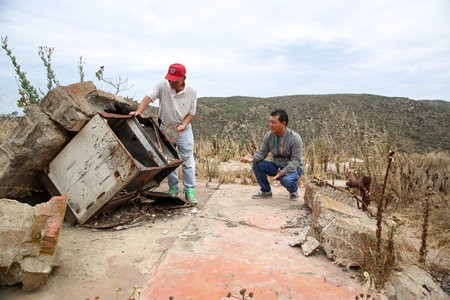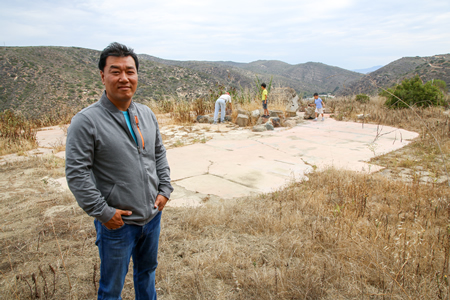Jae “Randy” Song paid $685,000 for a bucolic 12-acre lot in Canyon Acres at a bank auction in 2010. Assurances from the previous owner and various city officials that he would have “no problem” rebuilding on the footprints of the original home and outbuildings that were destroyed in a 1982 fire made the deal seem like a bargain.

Song, who emigrated from South Korea to the United States with his family when he was 9, has a background in engineering and currently works in marketing and boat repairs for Newport Shipyard. He and his father, an engineer and former diplomat, both looked forward to what they describe as hands-on fun resurrecting a home on the aerie-like property with sweeping canyon views and a slice of ocean vista beyond.
Believing the building permit to be a shoe in, Song readily envisioned installing his family there and enrolling his two sons, then toddlers, in Laguna Beach schools. But on a visit to the property this week, the boys, aged 6 and 8, explored what is still little more than a weed-choked foundation and examined the carcass of the stove believed to be the source of the fire that leveled the house over 30 years ago. The children have since started school in La Habra.
What Song couldn’t have anticipated was that his seemingly straightforward reconstruction would be stymied by conflicting city codes, inconsistent staff interpretations of his project and heightened public safety concerns in a neighborhood ravaged by the 1993 firestorm.
Frustrated by a lengthy and costly list of unexpected construction conditions, Song ended up hiring attorneys to challenge staff assertions and finally appealing to the City Council to intervene.
Legal fees have already cost him $120,000, a figure he estimates could rise by another $200,000, equal to his annual income, if the dispute ends up in litigation. “I’m at their mercy. I’m exhausted,” Song said in an interview.
Song uncovered a 30-year paper trail documenting a previously assured right to rebuild at 1199 Lewellyn Drive on the exact parameters of the previous structures. This included a July 1985 letter from the city’s then zoning administrator, John Connors, to potential buyers which noted that “the building may be rebuilt in kind with no greater horizontal or vertical dimension than was there when it was destroyed, without any problem. A permit will be needed but no variance nor will any more street improvements than exist be required.” City Attorney Phil Kohn subsequently referenced this allowance in a letter to then City Manager Ken Frank six months later. Then Zoning Administrator Kyle Butterwick picked up the same thread in a May 2001 letter to the previous owner, Scott Davison, telling him that reconstruction of the house “would not necessitate improvement to the access road serving the property,” nor was there any time limit to rebuilding the home “in an ‘in kind’ manner.”

Armed with his research, Song hired local architect Mark Singer to design a project within the old footprint. He said they worked with then Zoning Administrator Liane Schuller, who eventually told them the project was good to go.
So when he submitted building plans in February 2014, the city’s response floored him.
Then Principal Planner Nancy Csira, taking the reins from the now retired Schuller, sent back a list of 17 new development conditions that ranged from a hydrology report to a fire department review.
“We were treated as new development and that’s when the wheels came off the bus,” said Jim Lawson, Song’s land use consultant. “We’ve been scrambling ever since,” he said.
When Lawson asked for a meeting with staff to clarify what then appeared to be a misunderstanding about the project, he was surprised to find Fire Chief Jeff LaTendresse joining in.
Lawson said he began to sense staff intransigence about any building on the property. “I’ve never gone into something more optimistic and then been slammed with a phone book,” he said.
Song resorted to hiring the Los Angeles-based firm of Freilich & Popowitz, who reasoned with the city attorney that the city’s zoning code allowed a fire-destroyed home to be rebuilt and that Song should not be subjected to conditions imposed on new development before being issued a building permit. Correspondence shows that attorney Robert Freilich believed he’d reached a verbal understanding on this point with the city’s attorney, who then rejected it in writing, reiterating most of the staff’s conditions.
The most onerous of these is adhering to fire code and fire department review, which Song says constitutes enough of a burden to scuttle the project. He is being asked to build a 20-foot-wide access road able to withstand fire-truck loads of 74,000 pounds and locate enough water on the property to supply 1,000 gallons of water per minute for two hours, infrastructure that he describes as being adequate to serve an entire subdivision.
Song’s property is reached by an uneven, partially paved, one-lane track that winds up the canyon hillside with portions bordered by nothing so much as a steep downhill incline. It seems like a road to nowhere until it reaches the idyllic spot where the former home once stood.
Song’s attorneys sought a hearing with the Planning Commission to clarify what projects require fire department review. A year after Song submitted plans, the Planning Commission on Feb. 11, after two hearings, declined to rule on the project. They determined that their authority related only to the zoning code and did not extend to prohibiting the fire department from imposing requirements of the fire code, which was revised as recently as 2013 to mirror changes in the updated California Fire Code.
Staff maintains that regardless of how Song’s permit application was treated, any structure must adhere to the provisions of the fire code.
Song subsequently appealed the ruling to the City Council, which heard his claims — outlined in a one-inch thick spiral bound staff report — April 21. Among five areas of contention, Song claimed that he bought the land based on staff representations that he would be able to rebuild the destroyed structures. Moreover, Song pointed out that such reconstruction should never have been placed under fire department review in the first place.
If he can’t rely on documents from city officials going back 30 years that say he can rebuild, “what would you have me do?” asked Song, afterwards.
Song attorney Neil Popowitz pointed out that similar fire code restrictions were not imposed on other properties with similar issues, such as 1085 Bluebird Canyon Dr., and 1376 Lewellyn Dr., among others. Staff disagreed with that assessment.
The threat of fire in the box canyon isn’t theoretical. The 1982 fire that burned what stood on Song’s property consumed 35 acres of the canyon hillside, imperiled nearby homes, forced the evacuation of 100 people and required 51 fire companies and 291 firefighters to extinguish, the report says.
And scars remain from the 1993 firestorm that ignited in Laguna Canyon and went on to destroy 400 homes in several areas of the city.
That fire still haunts retired firefighter Carl Klass, whose property abuts Song’s. He urged the Council to insist that Song meet the conditions of the fire code before being allowed to build.
As the hearing concluded, Mayor Pro Tem Steve Dicterow asked Song’s attorney about consulting with experts on a compromise, and City Manager John Pietig suggested they might propose an alternate fire safety plan. Song agreed and the Council continued the hearing for 60 days.
While Song said the City Council hearing was the first time he felt like someone was listening, he remains unconvinced there is an affordable way to comply with the fire code, which leaves little latitude for interpretation.
With the help of a fire consultant, Song has since submitted an alternate fire safety proposal, but staff now wants the hearing, tentatively scheduled for June 16, postponed to August. Watching his children scamper about the rubble that might have been their home, Song expressed little hope for a swift and amicable resolution.





[…] told Song he’d have to rebuild the road, at an estimated cost of $2 million, in order to build a house […]
[…] The price tag: an estimated cost of $2 million in order to build. […]